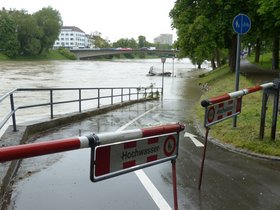"High-End Sea Level Rise" Workshop by the WCRP Grand Challenge and the SPP-1889
While sea level rise is one of the most unavoidable consequences of climate change, our knowledge on how fast it can develop under a given scenario of future greenhouse gas emissions over the 21st century, still remains highly uncertain, primarily due to considerable uncertainties in Antarctic ice sheet mass loss and associated processes.
Improving our knowledge and understanding on the evolution of future sea level rise and on low-probability but high-risk events, is of crucial importance for both mitigation and adaptation in coastal impact studies and coastal management strategies.
To this end, on 18 to 19 September, the Center for Earth System Science and Sustainability (CEN) hosted in Hamburg a meeting of international experts who discussed concepts of future “High-end Sea Level Rise”. Leading research experts from various natural and social disciplines, such as climate modeling and projections, cryosphere, glaciology and ice sheet dynamics, oceanography, meteorology, but also human-environment interactions, coastal engineering, geography, risk communication, and mitigation advice, gathered to discuss the different aspects of high-end (emission-dependent) scenarios of sea level change and change rates used in the literature and the IPCC reports, to improve the understanding on their different perspectives, but also discuss ways to estimate high-end sea level projections and how such information can be “translated” to best meet the users’ needs.
The discussion addressed the different dimensions of the problem of high-end sea level rise, setting up a common language and terminology (among different disciplines, experts/non-experts, etc), standing practices, such as in the case of UK and Netherlands, the current progress on ice dynamics, as well as the range of users and needs on high-end scenario information, among others.
The meeting participants stressed that sea level rise will not stop at the end of the 21st century but it will continue for several centuries after a global temperature rise comes to a halt. Results indicated that the likely range of sea level rise at the end of the 21st century stated in the IPCC AR5 is still consistent with current knowledge (within a few decimeters). However, meeting participants also emphasized that the IPCC report has never specified an upper-end sea level rise and has confirmed that doing so remains a challenge. Several different suggestions are floated in the literature, but concerns were raised regarding some of those suggestions. Their likelihood to occur was considered very low.
The meeting was organized by the WCRP Grand Challenge and the DFG SPP-1889 “Regional Sea Level Change and Society (“SeaLevel”)” program under the leadership of Prof. Detlef Stammer and the CEN, University of Hamburg. The outcome of the workshop will be a scientific paper on high-end sea level change scenarios, which will likely help further to the preparations of the IPCC AR6 and SROCC reports, but also to allow the sea level community to provide less ambiguous messages to the science and stakeholder community alike.

